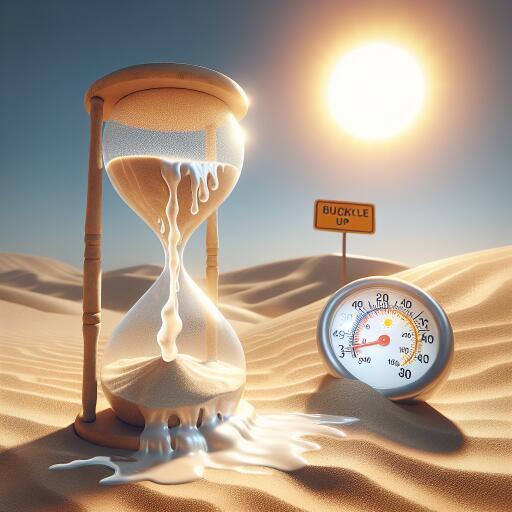
Last Year Was the Hottest Year in Recorded History. Buckle Up.
As data rolls in from monitoring agencies, the undeniable reality is laid bare: 2024 has gone down in history as the hottest year on record, challenging not only our understanding of the planet’s climate but also the resilience of human civilization.
The world seems locked in an unyielding trend of rising temperatures. However, 2024 stands out as particularly alarming due to a significant and worrisome milestone: global temperatures have tipped over the 1.5 degrees Celsius increase that countries worldwide pledged to avoid just a decade ago during the Paris Agreement.
Understanding the 1.5 Degree Threshold
To grasp the significance of the 1.5-degree threshold, a bit of historical context is essential. The precursor to the Paris climate commitment aimed to cap global warming at 2 degrees Celsius over pre-industrial levels. This figure was more than a mere number; it was the product of negotiations attempting to define the upper limit of temperatures humans have known since their evolution. The intent was to demarcate conditions beyond which catastrophic and irreversible environmental changes, such as significant sea-level rise due to melting Antarctic glaciers, were expected.
In the lead-up to 2015’s pivotal climate talks in Paris, new scientific research indicated that some devastating effects might occur with just a 2-degree warming, prompting advocates, including small island nations vulnerable to sea rise, to push for a stricter limit. As a result, the historic Paris Agreement set a twofold goal: to “hold the global average temperature increase to well below 2 degrees Celsius above pre-industrial levels” while pursuing efforts to limit it to 1.5 degrees Celsius.
The agreement also spurred one of the most critical scientific endeavors of its kind: The Intergovernmental Panel on Climate Change (IPCC) embarked on a comprehensive examination to reveal the specific impacts of a 1.5-degree world.
Implications of the New Reality
Exceeding this limit represents more than just scientific symbolism; it’s a stark warning. It marks a precarious shift, shaping new norms for natural and human systems. Ecosystems are already showing signs of transformation, with higher extinction rates for flora and fauna unadaptable to rapid climate shifts.
For humanity, a sustained increase above this limit could lead to more frequent, intense, and longer-lasting extreme weather events, including heatwaves, droughts, and heavy rainfall, coupled with alarming sea level rises. Coastal communities are bracing for the impact, with changes looming over agriculture, water supply, and public health, requiring urgent adaptation strategies.
The Road Ahead
This unprecedented marker of 1.5 degrees is not synonymous with insurmountable defeat, but rather a clarion call to action. It highlights the need for innovative policy, technological advancements, and a collective global effort to curtail emissions. Transitioning to renewable energy sources, enhancing energy efficiency, and fostering sustainable land use are paramount.
Moreover, this moment serves as a catalyst for stronger international cooperation and accountability. It urges nations, businesses, and individuals alike to reassess their carbon footprint and implement ambitious climate policies that uphold the spirit of the Paris Agreement.
The coming years will test humanity’s resolve and creativity. By prioritizing democratic debate, ethical considerations, and shared responsibilities, there’s still hope to steer the planet towards a more stable climatic future.
In conclusion, 2024 has set a historic benchmark that demands vigilance, responsibility, and an unwavering commitment to climate action. The need to protect and preserve the environment for future generations has never been more urgent.
In the face of this undeniable challenge, our unwavering resolve to address climate change and strive for sustainability remains our greatest asset. Engaging communities, enhancing educational efforts about climate science, and fostering international dialogue are crucial steps towards redefining our relationship with the planet.
Ultimately, this phenomenon challenges us to evolve and adapt, reminding us that the future hinges on our collective choices and actions today.





Leave a Reply